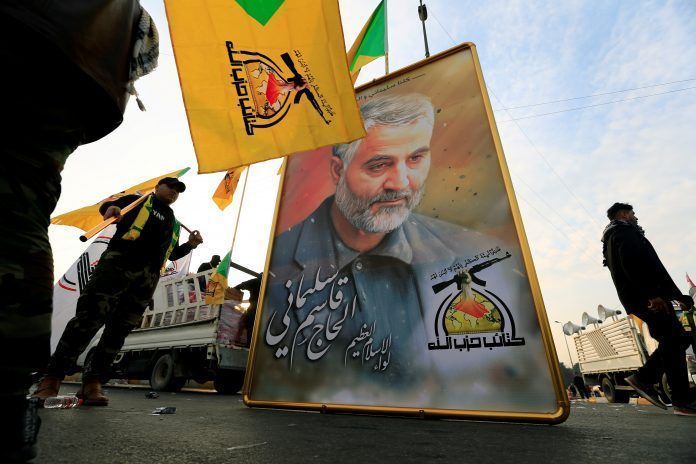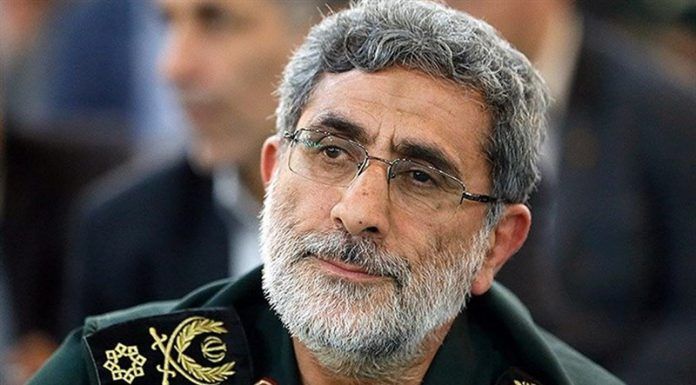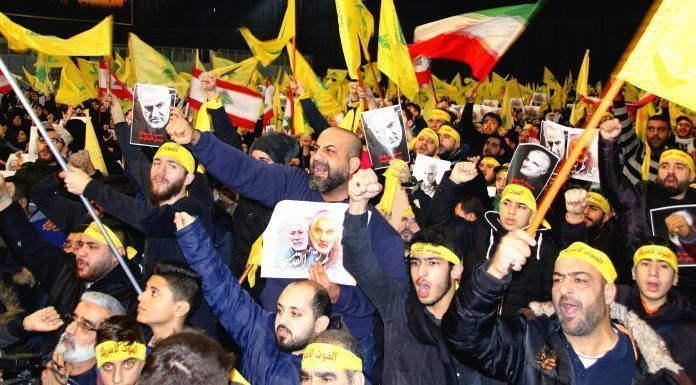
By Ahmad Rafat
January 3 marked the first anniversary of the death of the former Commander of the Islamic Revolutionary Guards Corps Qods Force (IRGC-QF), Lieutenant General Ghasem Soleimani, who was assassinated in a U.S. drone attack on Baghdad International Airport.
The attack also killed Abu Mahdi al-Muhandis, the Commander of Kata’ib Hezbollah (Hezbollah Brigades). Kata’ib Hezbollah is part of the Popular Mobilization Forces (PMF) — an Iraqi state-sponsored umbrella organization comprising some 40 militias that are mostly Shia Muslim groups but also include Sunni Muslim, Christian, and Yazidi groups.
General Soleimani was Iran’s principal military strategist and tactician in the Middle East. His death delivered a massive blow to the power and influence of the Islamic Republic in the region.
It was Soleimani and not the Iranian Foreign Ministry that set the Islamic Republic’s regional foreign policy, which was not based on diplomacy and economic development but on promoting an “axis of resistance” and a “strategic depth” that fueled crisis and war.
Iran’s influence has significantly diminished in the region since the death of Soleimani. The current head of the IRGC-QF, General Ghaani, is not as charismatic as Soleimani and lacks in-depth knowledge of the region. He also does not have close ties with the Shia militias in the Middle East.
The media described Ghaani as a ‘man in the shadows’ when he was first appointed as the head of the IRGC by Iran’s Supreme Leader Ayatollah Ali Khamenei. He has not established himself as Iran’s foremost representative to the region, even after a year in the job.
The Tehran-based Tasnim News Agency, which has close ties to the IRGC, recently published a speech, delivered by Soleimani on June 12, 2011, in which he said: “War is the driving force behind exporting our revolution. War has probably played a more significant role than any other event, even the revolution, in shaping our country and its culture.”
The Islamic Republic has tried to portray Soleimani as a “national hero” and a “Muslim nationalist.” The campaign has even led Soleimani’s detractors to toe the official line by hailing the late general as a “national commander” and describing Qods Force’s military adventures as “efforts to protect the country’s security and territorial integrity.”
“A country in decline needs a hero,” Hassan Ghazian, a prominent Iranian sociologist, has said. “The Islamic Republic sold Ghasem Soleimani as a hero to the public. The state has resorted to creating martyrs and heroes to compensate for its loss.”
But some of Iran’s neighbors, particularly Afghans, hold a different view of Soleimani. They say his hands were “drenched in their youths’ blood.” Human rights observers accuse Soleimani of committing “war crimes” to recruit young Afghan men into Fatemiyoun Division (Liwa Fatemiyoun) to fight in Syria.
Still, the Islamic Republic continues to mythologize General Soleimani.
The spokesperson for the newly formed “Commander Soleimani Headquarter” Hassan Amir Abdollahian, has reportedly said that the late general “had visited his family members and friends in their dreams, outlining to them his military operations against Israel.”
Many streets and buildings in Iran have been named after General Soleimani in the past year. People even suggested that Tehran’s Mehrabad Airport be renamed Ghasem Soleimani Airport. Yet officials opposed the idea.
A proposal was submitted to the Majlis (Iranian Parliament) in the past few days calling for the Qods Force’s budget to be increased on the anniversary of the general’s death. It also asked that 1 percent of Iran’s non-oil exports to Iraq be allocated to the Qods Force for “avenging Soleimani’s assassination” and “driving U.S. forces out of the Middle East.”
The proposal further called for 30 percent of the country’s total imports, including of American brands, to be invested instead in promoting the legacy of Ghasem Soleimani and on a “campaign for strengthening the axis of resistance.”
Iran exported nearly $5 billion in non-oil products to Iraq last year.
Many Iranian officials have called for avenging Soleimani’s death in the past year, though they all believe that the “axis of resistance” should lead any such operation.
“The enemy should not think that those responsible for the assassination would be immune from legal prosecution, even the American president,” the head of Iran’s Judiciary Ebrahim Raisi was quoted by Tasnim on Jan. 3 as saying. “None of them will be safe anywhere in the world. The ‘axis of resistance’ is resolved to exact revenge.”
In comments reported by Emtedad News, the current Commander of the IRGC-QF Brigadier General Esmail Ghaani said: “Wherever in the world we find a [real] man, he will be ready to bring the culprits to justice.”
However, the leaders of the groups within the “axis of resistance” have rejected the call, arguing that the Islamic Republic should take any measure aimed at avenging Soleimani.
“We are confident that Iran will avenge Soleimani’s murder at the hands of Americans without the help of its allies in the region,” the Secretary-General of Lebanese Hezbollah Hassan Nasrollah said in a speech marking the anniversary of General Soleimani’s death.
The Islamic Republic has not carried out any operation in retaliation for Soleimani’s assassination in the past year. Undoubtedly, U.S. military forces in the Persian Gulf have played a role in dissuading Iran from committing any provocative act. On Dec. 31, two U.S. Stratofortress B-52 bombers flew over the Persian Gulf.
A week earlier, the U.S. Navy sailed its Ohio-class guided-missile submarine USS Georgia into the Persian Gulf. On the same day, an Israeli submarine reportedly crossed the Suez Canal and surfaced near the Strait of Hormoz. These measures aimed to discourage Iran from taking any military action against the U.S. and its regional allies.
Speaking at the Israel Defense Forces’ (IDF) Operational Achievements Award on Dec. 22, the Chief of the General Staff of Israel Aviv Kochavi said: “If Iran and its partners, members of the radical axis, either directly or by proxy, will take action against the State of Israel, they will find themselves in a very costly endeavor.”
“The IDF will strike all those involved in activities against the State of Israel or Israeli targets, whether in part or in full, be it near or far,” General Kochavi was quoted by the Jewish News Syndicate (jns) as saying. “Our retaliatory steps have been prepared and rehearsed. I advise our enemies not to test us.”
In comments reported by the Israeli i24 News TV Channel on Dec. 21, General Kenneth F. McKenzie Jr., the Commander of the U.S. Central Command (CENTCOM), said: “We are prepared to defend ourselves, our friends and partners in the region, and we are prepared to react when necessary.”
So far, Iran’s threats have been limited to inflammatory rhetoric.
During a press conference on Dec. 28, the spokesperson for the Iranian Foreign Ministry Saeed Khatibzadeh said: “We have used various channels to let the U.S. know that we were not seeking to escalate tensions.”
Meanwhile, the Islamic Republic’s influence in the Middle East has declined because of crippling economic sanctions and mass protests in Lebanon and Iraq against Iran’s meddling in those countries’ domestic affairs.
Bachar El-Halabi, a Lebanese research analyst, believes that the protests that started in October 2019 in Iraq and are continuing today have opened a new chapter in Middle Eastern politics.
“While the protests were mainly against rampant financial corruption among senior officials in these countries, they also targeted political parties and politicians under the Islamic Republic’s control,” Mr. El-Halabi said.
As Prime Minister Saad Hariri has been trying to form a new government in Lebanon in the last few weeks, three prominent political leaders have called for the resignation of pro-Iranian Lebanese President Michel Aoun.
“I would resign If I were in Michel Aoun’s place and call for a parliamentary election immediately,” Samir Geagea, the leader of the Christian political party Lebanese Forces, recently said.
Suleiman Tony Frangieh, the leader of another Lebanese Christian political party Marada Movement, has called on President Aoun’s friends to “urge him to resign.”
Meanwhile, Walid Jumblatt, the leader of Lebanon’s Progressive Socialist Party, believes that President Aoun and his supporters, inside and outside Lebanon, notably the Islamic Republic, have lost and “must leave.”
The situation for the Islamic Republic is not much better in Iraq.
On Dec. 30, Iraqi Prime Minister Mustafa Al-Kadhimi dispatched Muhammad Abu Hashemi, the former head of prime minister’s office, to Tehran with a message, reportedly urging Iran to exercise greater control over the militia groups operating under its auspices.
Mr. Al-Kadhimi has supposedly warned that provocative actions by Tehran and Iraqi forces under its control could “spark a new tragedy.” He has allegedly asked Tehran to stop meddling in Iraq’s internal affairs.
Nor is the Islamic Republic faring much better in Syria, another member of the so-called “axis of resistance.”
The Israeli air force has been pounding IRGC bases and Shia Militia groups in Syria in the past year. Also, Tehran has been practically excluded from the trilateral peace talks in that country.
Only Turkish and Russian foreign ministers attended the last two rounds of peace talks held in the Russian resort town of Sochi. Iranian Foreign Minister Mohammad Javad Zarif was not invited to those meetings.
In speeches delivered on the anniversary death of General Soleimani, Iranian officials concealed the diminishing influence of Tehran on the militia groups in the region.
In comments reported by Tasnim, the Commander of the IRGC’s Aerospace Force Amir Ali Hajizadeh, said: “All the missile capabilities shown in the Gaza Strip have been made possible by the Islamic Republic.”
The Islamic Republic has given $17 billion in military help to the members of the “axis of resistance” in the past 30 years, according to Deputy Coordination Commander of the IRGC Brigadier General Mohammad Reza Naghdi.
Heshmatollah Falahatpisheh, a member of the National Security and Foreign Policy Committee of the Majlis, has said Iran spent between $20 billion and $30 billion on the Syrian War.
In a recent interview with the Arabic-language Iranian Al-Alam TV, Hamas’s former Foreign Minister Mahmoud al-Zahar said he met Soleimani during a trip to Tehran in 2006, adding that the former head of the IRGC-QF had given him $22 million stuffed in nine bags to pay salaries of Hamas members and help the people in the Gaza Strip.
This article was translated and adapted from Persian by Fardine Hamidi.



